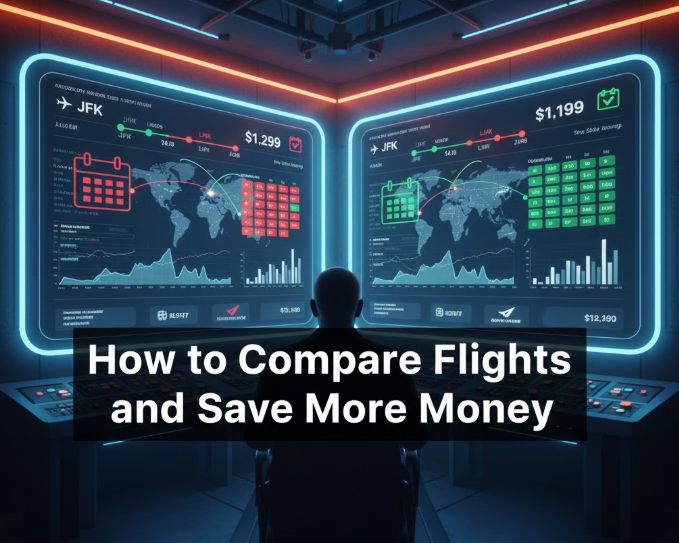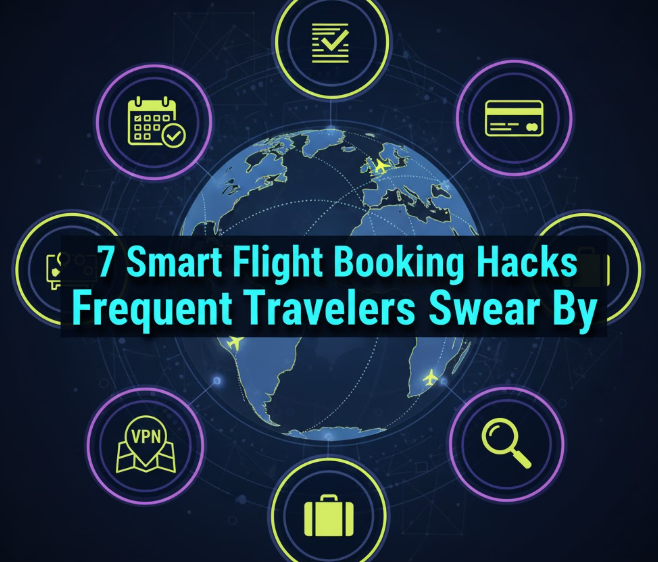By J Shares Shayla
Ever feel like airlines are hiding something from you? You’re not wrong. Long behind a wall of heavily guarded secrets — ones that could save you money, keep you safer and if not make your travel experience great again, at least make it tolerable — has been the airline industry. From pricing scams to plain dangerous shortcuts, we bring you our top insights, gleaned from industry insiders. Strap in as we go deeper to reveal truths that airlines would prefer to keep at 30,000 feet.
The Ticket Pricing Dark Arts
Why Tuesday at 3 PM Isn’t Really the Cheapest Period
You’ve likely heard the urban legend that you should book flights on Tuesday afternoons in order to get the best deal. Airlines love this widely held myth because it diverts your attention from the actual secret: They have dynamic pricing algorithms that can change fares 50 or so times per day, according to sources, sometimes by only $1 or $2 and sometimes by much more based on factors like your browsing history (if you’ve been repeatedly looking at a specific flight), where you’re located at those moments and which device you are using.
When you search for flights, airlines add cookies to your browser that monitor what you’re looking at. Return later, and mystically that $200 ticket is now priced at $350. They’re wagering you will soon freak out and book before prices go “even higher.” The solution? Always search in incognito mode and clear your cookies between searches!
Pro Tip: Airlines typically release unsold seats at reduced prices 3-4 weeks before departure, then again 1-2 weeks out. These windows are real deals because empty seats make them no money.
The Fake Urgency Game
That pop-up notice that you’re down to “Only 3 seats left at this price!” are often completely manufactured. Airlines are using scarcity to tap into your fear of missing out. In reality, they might have 40 seats available at that price tier, but a low number makes you book faster without checking on the competition.
Questionable Price Strategies
| What They Do | Your Defense |
|---|---|
| Cookie Based Increases – Prices increase when you revisit | Use browser’s incognito mode |
| Fake Scarcity – “Only X seats left” messages | Always look at multiple sites when booking |
| Location Markup – Prices adjust to your country | Use VPN to compare international prices |
| Weekend Premium – Saturday/Sunday has higher priced flights | Fly on Tuesday/Wednesday/Thursday |
For more travel tips and flight deals, visit Call to Flights.
The Truth About What Happens to Your Luggage
The Unpleasant Truth Behind the Scenes
Baggage handlers are subjected to extreme time pressure, with only 30-45 minutes to unload, sort and reload hundreds of bags between flights. This furious pace results in your luggage being thrown, dropped and generally manhandled much more often than the airlines let on. Those “fragile” stickers? They’re generally dismissed by most handlers altogether (though there is no time for gentle treatment of bags).
Even worse: things routinely get stolen from checked bags. Even though the airlines faulted passengers for not properly stowing their property, industry insiders acknowledged that theft is more common than reported. To be sure, pricey electronics, jewelry and designer goods are especially at risk. TSA-approved locks don’t offer much protection, as suitcases are accessible to baggage handlers and airport screeners, who have master keys.
Important Fact: About 25 million bags are lost by airlines every year worldwide. That’s about 5.5 bags out of every thousand passengers, but that number is for only the bags that are actually reported as lost.
Why Bags Really Get Lost
Lost luggage isn’t always accidental. Airlines occasionally intentionally leave bags behind when flights are overbooked or running late in order to lighten the load and cut fuel costs. They’ll load the bags of the most important connecting passengers first and leave others behind for a later flight. You’re not going to read this admission in a policy white paper.
The Real Dirt on Airplane Food and Water
What Flight Attendants Never Eat
Ask any veteran flight attendant what they avoid, and they’ll tell you: anything with ice and the coffee or tea. Planes don’t clean the water tanks very well. Testing has identified alarming levels of bacteria in airplane water systems, yet airlines persist in serving drinks made from tap water stored in these tanks.
Food is not much better. Airplane meals are cooked days before being served, frozen and then reheated in ovens whose temperatures may not always reach the needed levels to be safe. The low cabin pressure and dry air also desensitize your taste buds up to 30%, which explains why airline food tastes so bland. Airlines know this and frequently over-salt and over-season the meals to make up for it.
Airplane Food Safety Issues
- Water Contamination Risk: 85%
- Improper Food Storage: 65%
- Temperature Control Issues: 40%
- Inadequate Cleaning: 55%
Distribution of flights impacted by various food safety issues as per industry reports
Safety Shortcuts Worth Knowing
The Minimal Cleaning Between Flights
Airlines tout their tough cleaning protocol, but the routine is less than stellar. Cleaning crews have between 15 to 20 minutes during a layover to “clean” an entire plane. This quick turn time means they are essentially doing a surface-level tidy: picking up trash, folding tray tables and perhaps wiping down armrests if there is time.
Between flights, seat pockets, bathroom surfaces and overhead bins are seldom thoroughly cleaned. Reports have found traces of fecal bacteria, E. coli and MRSA lurking on airplane surfaces even after being “cleaned.” The deep cleans airlines advertise generally only occur once every 30-45 days and, in some cases, even less often on budget carriers.
Learn more about airline safety standards from aviation authorities.
Maintenance Deferrals You Should Seriously Worry About
Here is something airlines definitely do not advertise: they can legally defer certain maintenance issues and still keep you in your seat at 35,000 feet. Planes are allowed to take off with certain broken parts, while still in compliance with the Minimum Equipment List (MEL), as long as a part does not qualify as “essential” for that flight.
This could mean that your plane’s coffee makers do not work (all right), cabin lights are broken (annoying) or even some of your aircraft’s navigation backup systems are not functioning (worrisome). Although large, critical safety systems need to work exactly right, “large” is a more flexible term than passengers would prefer.

Your Rights That Carriers Don’t Want to Talk About
Compensation You’re Entitled To
The vast majority of passengers don’t know that they’re owed money when flights are delayed or canceled. For instance in the European Union, passengers are entitled to up to €600 ($650) for a long delay or cancellation under EC 261/2004 regulations. Other countries have a similar law, but the airlines do not usually provide that information voluntarily.
In the United States, if you are bumped after an overbooked flight — and you cannot be persuaded to take a later one voluntarily — it is legally required that the airline pay you compensation ranging from 100 to 400 percent of your one-way fare (with a maximum of $1,550), depending on how late. However, fewer than 1 in 10 qualifying passengers actually get the money back as airlines don’t make it transparent or simple to claim.
Passenger Rights Summary
| Situation | Your Rights | Compensation Up To |
|---|---|---|
| Overbooked Flight (US) | Automatically entitled compensation for involuntary bumps | $775 – $1,550 |
| Delayed 3+ Hours (EU) | Cash compensation based on distance | €250 – €600 |
| Lost Luggage | Reimbursement for essentials | Up to $3,800 (international) |
| Damaged Bags | Repair or replacement cost | Varies by carrier policy |
The Fine Print That Lets Them Get Out of It, Not You
And when you click “I agree” to those terms and conditions, you are typically waiving rights about which you had no clue. As part of the fine print, many airlines include mandatory arbitration clauses that bar you from joining class-action lawsuits or taking them to court. Instead, disagreements are taken to private arbitrators who side with airlines in about 80% of cases.
Behind the Scenes with Flight Crews
What Flight Attendants Can’t Say Out Loud
Flight attendants are trained to deal with any number of emergencies, sure, but they’re also trained never to panic passengers. Remember all of that bumpy turbulence that brought them down so quickly? It was likely more dangerous than they knew. Airlines train crews to minimize concerns to avoid causing panic, even when the circumstances are genuinely hazardous.
And, flight attendants are not paid for time on the job outside of when the airplane door closes and opens. And that helpful friendliness with your bags and pre-flight service? They’re doing it for free. This also means that for say a “9-hour workday” they could be getting paid for only 5-6 of those hours if that long but flying other close to maxed out duty times.
Insider Tip: If you need the flight crew for something important, press the call button to get their attention. If you’re in dire straits, proceed to the galley area and say “medical” or “emergency.” These are what’s known as “trigger words,” that set off instant response protocols, which pressing a call button doesn’t.
The Actual Reason For Some “Safety” Guidelines
Why do window shades have to be open for takeoff and landing? Airlines say this is so your eyes adjust to light outside if you have to make an emergency evacuation. The fuller truth: It allows flight attendants to get a quick look at conditions outside, such as fire or debris, and decide which exits can be used safely.
Remember that advice to turn your phones to airplane mode? In reality, modern aircraft are pretty much insulated from phone signals. When hundreds of phones attempt a very fast sweep to connect to cell towers, as on landing, it can overload ground networks and prove disruptive to those on the ground, not the airplane in the air.
The Overbooking Scam
Why They Sell More Seats Than Tickets
Airlines intentionally overbook by 5-15% for flights because they know a percentage of people will be no shows. This is a perfectly legal practice of overbooking that assures they make as much money from each plane. If a lower number of people than the planning factor don’t make the flight, someone misses out – and it won’t be those in business class or turned-up-every-week-on-time flyers.
In the first place, the algorithms that calculate overbooking levels are refined, taking into account route history, time of year, ticket type and profiles of passengers. Budget tickets and basic economy fares will also likely get bumped the most because what those passengers offer in revenue is, well, very little, and they typically don’t have as many connections to protect.
Loyalty Programs: The Point Trap
Why Your Miles Aren’t Worth What They Once Were
Airline loyalty schemes are a masterclass in conjuring an illusion of value, while delivering less and less. In essence, miles are the airline’s currency, and they can devalue them at any time for whatever reason. Most major airlines over the past decade have decreased the value of miles by 30 to 50 percent through “dynamic pricing,” which makes reward seats cost more points.
The reality: airlines make a killing selling miles to credit card companies and partners. Some make more money off frequent-flier programs than actually flying planes, in some cases. That is to say, keeping you chasing points and status is more important to them than being of service.
Reality Check: The typical person would have to spend $25,000 on a co-branded airline credit card to score enough points for one savers-style “free” domestic round-trip that would cost about $300 if purchased with cash.
How to Take Charge of Your Flying Experience
So now that you know what airlines don’t want you to know, here’s how to fly smarter. Book in private browsing, learn your passenger rights, and pack some of your own sealed water and snacks so you never assume an airline will provide the information they’re not obligated to if it costs them money. These companies prey on ignorance to extract as much money from you as possible – but with this knowledge in hand, the playing field has been leveled.
Of course, amidst all these industry mysteries, flying continues to be the safest form of travel. The trick is to be a savvy consumer who asks questions, keeps records when things go wrong and isn’t shy about insisting on the compensation you’re legally owed. When it comes to fair treatment, the sky doesn’t have to be the limit.
For expert advice on booking affordable flights and navigating airline policies, check out Call to Flights.

Frequently Asked Questions
Q: Can airlines really track my searches and boost prices?
A: Yes, airlines employ complex dynamic pricing and browser cookies to follow users’ behavior. They don’t outright acknowledge ad targeting at the individual level, but they do take into account that kind of thing in their algorithms: search history, location and demand patterns. When purchasing tickets, use incognito mode and delete cookies to help bypass any personalized price increases.
Q: How do I know if my flight is actually overbooked?
A: Airlines do not make it public ahead of time when flights are oversold — you’d have to ask the right question at the ticket counter, hear an announcement seeking volunteers at the gate or notice agents checking standby lists early. The risk is greater if you have a basic economy ticket on a popular route.
Q: Is it really too dangerous to drink the water aboard airplanes?
A: Studies have found excessive levels of bacteria in airplane water tanks. And while it won’t sicken most healthy adults, flight attendants tend to avoid drinking coffee or tea that’s made with airplane tap water. If you can, stick with bottled beverages, and definitely avoid the ice.
Q: If my flight is delayed and I’m not offered compensation, what can I do?
A: Document everything: take pictures of delay boards, keep emails and have airline personnel give written statements. Look up the passenger rights laws of your departure country (EU regulations are most robust). Register a complaint through the airline’s website, and if that does not work, escalate to regulatory agencies in aviation.
Q: Are expensive airline seats cleaned better than the cheap ones after a flight?
A: No, not generally during routine turnarounds. Between flights, all seats receive the same hurried cleaning. First and business class zones may receive a touch more attention during deep cleans, but the contrast isn’t as dramatic. Bring disinfecting wipes for any seat (class be damned).
Q: Can I refuse to fly if I observe maintenance problems?
A: Yes, if you’re uncomfortable with something you can certainly say you don’t want to board. If there is a legitimate safety concern that the airline agrees upon, you will be refunded. If you see something, say something to the gate agent or flight crew right away.






